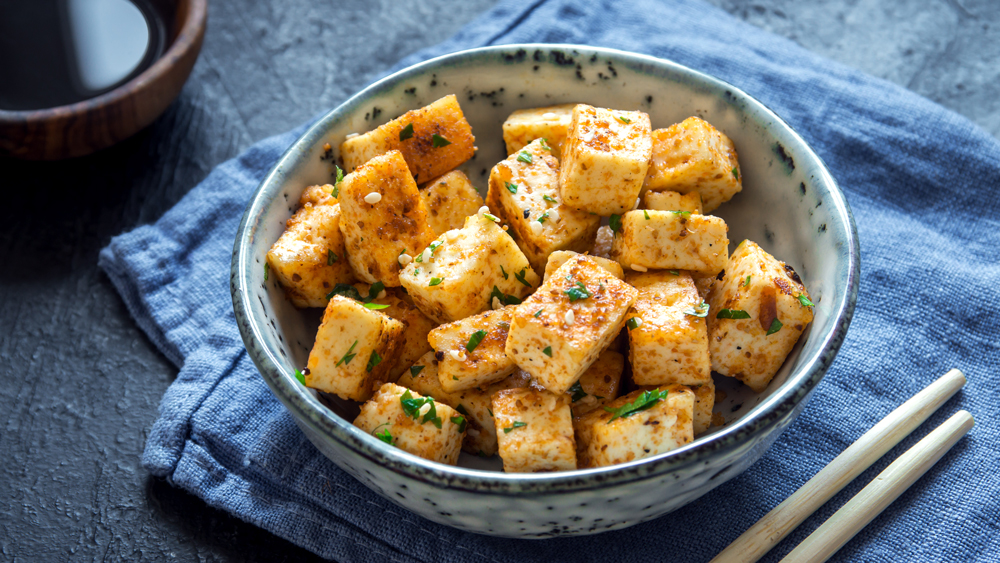Is Soy A Good Source Of Protein?
Expert advice on the pros and cons of eating soy protein

When you switch to a vegetarian or vegan diet, one of your first concerns might be how you’re going to get enough protein without eating meat. But there’s no need to worry – protein is readily available from a wide variety of plant sources and it’s not hard to get the amount you need from your diet.
However, one important difference between plant and animal proteins is the proportion which are “complete” proteins, which means sources that contain the nine essential amino acids we need to get from our diet. All animal proteins are complete, while only a handful of plant proteins are.
One of the complete plant-based sources is soy (aka soya), making it an attractive addition to a plant-based diet and a popular ingredient in vegan protein powders. For more information on soy and to find out any potential disadvantages of eating it, we put some questions to sports dietitian Linia Patel, who was speaking on behalf of the British Dietetic Association.
Is soy a good source of protein, especially for people on a plant-based diet?
Plants foods do contain protein, albeit in lower amounts and different compositions to meat. It’s this composition that determines if it’s a complete protein or not. However, an appropriately planned vegan diet can definitely meet your protein intakes. While combining of plant-based proteins [so you consume all nine essential amino acids] is not needed at every meal, it is vital to ensure that a vegan diet is well varied. As long as an individual meets their energy requirements then a diet based purely on plant foods will provide sufficient protein.
Soy, including products made from it like edamame, tempeh and tofu, is one of the few complete plant-based proteins. Soy is a good addition to many diets but certainly not essential. Others are hemp seeds, chia seeds, spirulina, nutritional yeast, Quorn (mycoprotein, which may also contain egg albumin), seitan, quinoa and buckwheat.
Are there any downsides to eating soy products?
Soy products like tofu, edamame beans and tempeh contain isoflavones called phytoestrogens, and this is the reason why some have raised the question as to whether soy products are safe. However, the evidence is reassuring so for the majority of us it’s fine to include in our diets.
The phytoestrogens found in soy products are in some ways similar to oestrogens – female sex hormones – but are much weaker. Most studies have found that soy when consumed in moderation has no adverse effects on male hormones like testosterone and may actually help men prevent prostate cancer. With regard to fertility, soy products in moderation do not have a “feminising” effect.
Thyroid hormones are another area that has been studied. Soy has no adverse effects on your thyroid, but it may reduce the absorption of thyroid medications in some people. Speak to your GP if you are concerned.
There is also strong evidence to show that regular soy intake decreases risk of breast cancer, although not yet enough evidence to recommend soy to all breast cancer survivors. It depends on the type of cancer and, again, you should speak to your GP.
What kind of soy foods should you add to your diet?
It’s best to eat soy foods that have undergone minimal processing like edamame, tofu, tempeh, and soy milk. Take it easy on the tofu sausages and burgers. Also play the moderation game – keep it to a maximum of two servings a day of whole soy foods.
Is soy protein powder a good substitute for whey protein powder?
A lot of the studies that have been done, comparing different protein powders and the response of protein synthesis – how well your body builds muscle after training – have shown that there’s no difference between someone taking whey protein and someone taking soya protein.
The question I would ask is: why do you not want to take whey? Is it because you’re getting an upset stomach after taking it? Some people are more sensitive to milk protein, and soy would absolutely be a good substitute.
Is soy protein isolate preferable to normal soy protein powder, beyond the fact that it just has a higher concentration of protein?
No, the difference is very marginal. The key is when you’re looking at protein synthesis is the amino acid leucine, which starts off the protein synthesis. You need to have 2g or 3g of that and you get that if you’ve got 20g of protein. Isolate versus concentrate is very kind of “fine print”. For the majority of people it doesn’t have to be concentrate – they can go with an isolate, as long as they’re getting 20g of protein.
- The Best Vegetarian Sources Of Protein
- The Best Sources Of Protein For Vegans
- 3 High-Protein Vegan Recipes From The Vegan Athlete’s Cookbook
Sign up for workout ideas, training advice, reviews of the latest gear and more.

Nick Harris-Fry is a journalist who has been covering health and fitness since 2015. Nick is an avid runner, covering 70-110km a week, which gives him ample opportunity to test a wide range of running shoes and running gear. He is also the chief tester for fitness trackers and running watches, treadmills and exercise bikes, and workout headphones.
- Jonathan ShannonFormer editor
